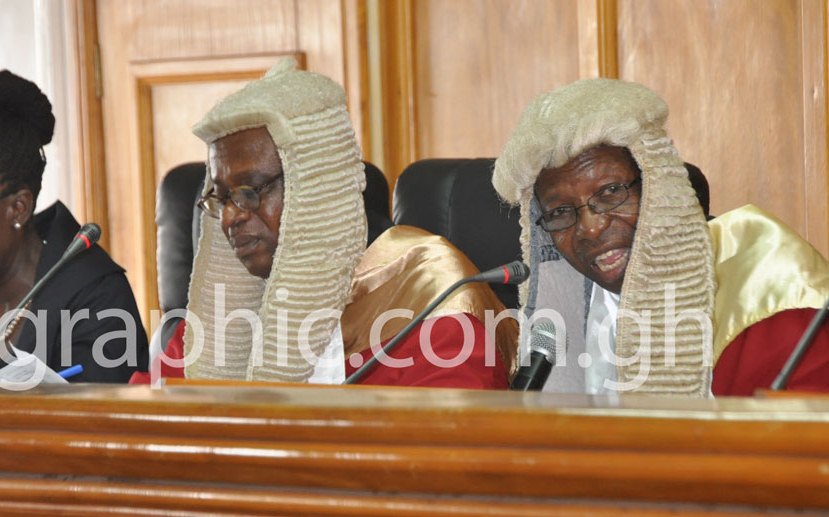Grounds for appealing against conviction for robbery
 Criminal law and procedure – Committal proceedings – District magistrate – Duty of – Duty spelt out in Act 30, s 184(4) – Nature of duty – Committal court perusing bill of indictment and summary of evidence and all relevant documents and preliminary evidence – Committal court finding sufficient evidence for successful prosecution of accused –
Criminal law and procedure – Committal proceedings – District magistrate – Duty of – Duty spelt out in Act 30, s 184(4) – Nature of duty – Committal court perusing bill of indictment and summary of evidence and all relevant documents and preliminary evidence – Committal court finding sufficient evidence for successful prosecution of accused –
Advertisement
Whether or not non-compliance with sections 187 and 188 of Act 30 occasioning substantial miscarriage of justice as contemplated by section 406(1) of Act 30 – Indictment or charge – Bill of indictment – Amendment of – Circumstances when proper to amend bill of indictment under section 232(1) of Act 30 – Defence – Alibi – Nature of alibi – Defence of alibi intended to be or raised under section 131 of Act 30 to be clear and specific –
Plea – Absence of plea in respect of third count of robbery – Effect – Jury trial – Mis-direction – Trial court directing jury to the effect that onus on prosecution to establish case against accused – Further direction as to standard of proof requiring no shifting of burden from prosecution to defence – Whether or not trial court mis-directing jury by non-direction.
Supreme Court, Accra
(Criminal Appeal No J3/2/2011)
Published Thursday, May 30, 2013
Okeke and others v the republic
before their lordships: sophia akuffo, sophia adinyira, r c owusu, anin Yeboah and gbadegbe jjsc Judgment on May 30, 2012
The appellants, Ben Okeke and three others, were charged with the offences of: (a) conspiracy to commit robbery; and (b) two counts of robbery contrary to sections 23(1) and 149 of Criminal Offences Act, 1960 (Act 29). At the High Court, Sekondi, they were tried on indictment and convicted of the offences.
They were each sentenced to 25 years imprisonment with hard labour on each count to run concurrently. On appeal to the Court of Appeal, their conviction and sentences were affirmed. The appellants further appealed to the Supreme Court on the grounds, inter alia, that:
(i) There was non-compliance with section 187(1) (taking statement of accused before committal); and section 131.
(3) (calling on the accused to give notice to the prosecution as to particulars of alibi raised by them) both of the Criminal and Other Offences (Procedure) Act, 1960 (Act 30), and therefore the committal proceedings were a nullity; (ii) the amendment to the bill of indictment after the close of the case for the prosecution had occasioned a substantial miscarriage of justice to the appellants; (iii) there was mis-direction by non-direction of the jury as regards alibi since the appellants had claimed they had not been at the scene of the crime;
(iv) failure to take the pleas of the appellants in respect of count three was fatal to the prosecution’s case; and (v) the Court of Appeal had erred when it held that the summing-up was faultless when the trial High Court Judge had misdirected himself by non-direction of the jury as to what constitutes a “reasonable doubt” in a criminal trial.
On these facts, the Supreme Court unanimously dismissed the appeal by the appellants against the judgment of the Court of Appeal, on, inter alia, the following grounds:
First, the duty of the district magistrate court in committal proceedings has been amply spelt out in section 184(4) of the Criminal and Other Offences (Procedure) Act, 1960 (Act 30); the duty was to determine whether there was a case for the accused to answer.
The duty of the district magistrate was not to find out whether a prima facie case had been made against the accused; nor to determine the credibility of the accused or his witnesses.
And there was no requirement for a magistrate to hear the evidence of witnesses on oath before the committal of the accused. In the instant case, the chairman of the community tribunal had found, after perusing the bill of indictment and summary of evidence and all relevant documents, that there was sufficient evidence to successfully prosecute the accused persons.
Thus even assuming that the provisions in sections 187 and 188 of Act 30 had not been complied with (as contended by counsel for the appellants, from the record appeal, such an omission could not be said to have occasioned a substantial miscarriage of justice as was contemplated by section 406(1) of Act 30.
Second, the provision in section 232(1) of the Criminal and Other Offences (Procedure) Act, 1960 (Act 30), was quite explicit that an amendment to a bill of indictment, might be made at any stage of the trial unless, having regard to the merits of the case, the amendment could not be made without injustice. In the instant case (as shown from the record of appeal), counsel for the appellants had not objected to the amendment. In any event, nowhere in his statement of case had counsel for the appellants been able to demonstrate to the court the manner in which the amendment had occasioned an injustice to the appellants.
It was not sufficient for counsel for the appellant to simply make a sweeping statement that a substantial miscarriage of justice to the appellants had occurred, without showing how it was caused.
Third, the procedural requirements under section 131 of the Criminal and Other Offences (Procedure) Act, 1960 (Act 30), where the defence of alibi was intended to be or had been raised were quite clear and specific.
In the instant case, though the trial judge had failed to comply with the requirements of subsection (3) of section 131 of Act 30, in that he had failed to call on the accused persons to give notice to the prosecution of the particulars of the alibi raised by them, he had not excluded them from the evidence.
Rather, he had considered the evidence in his summing-up to the jury and had asked the jury to consider the statements of the accused persons and their testimony before the court and to convict or acquit based on all those statements.
The third ground of appeal was, therefore, quite untenable as there had been no misdirection of the jury, concerning the appellants’ defence of alibi.
Fourth, though there was no record of the pleas of the accused having been taken on count three relating to the offence of robbery, the bill of indictment had clearly showed that the appellants had been charged with one count of conspiracy to commit robbery, and two counts of robbery.
In addition, the record of proceedings showed that the appellants had been tried in respect of count three as evidence was led on that count. 
Thus the prosecution at the trial had led evidence through the first and second prosecution witnesses to prove the guilt of the appellants as regards the third count of robbery.
Besides, the trial judge in his summing up to the jury, had considered the testimonies of all the prosecution witnesses in respect of count three and had directed the jury to do same.
And during the trial, counsel for the appellants had not raised any objection under section 406(2) of Act 30 when evidence was led on count three. Indeed, counsel for the accused had cross-examined the first and second prosecution witnesses in connection with the said count three.
Consequently, there was no basis for the Supreme Court to interfere with the conviction of the appellant under section 406(2) of Act 30.
In other words, no substantial miscarriage of justice had been occasioned merely because their plea had not been taken at the trial with regard to count three.
Fifth, the direction given by the trial judge to the jury was clear enough to show the jury that the onus or burden was on the prosecution to establish its case against the accused persons.
The trial judge had also directed them clearly enough concerning the standard of proof required of the prosecution.
He had given them clear enough direction to prevent them from shifting the burden of proof from the prosecution to the defence unless the prosecution had met the standard of proof required of it.
Thus, the judge had adequately placed the jury in a strong position to understand the duty cast on them; and as such the judge had rightly directed the jury. There was no misdirection or non-direction whatsoever.
By Dr S. Y. Bimpong-Buta, FGA, Barrister at Law



